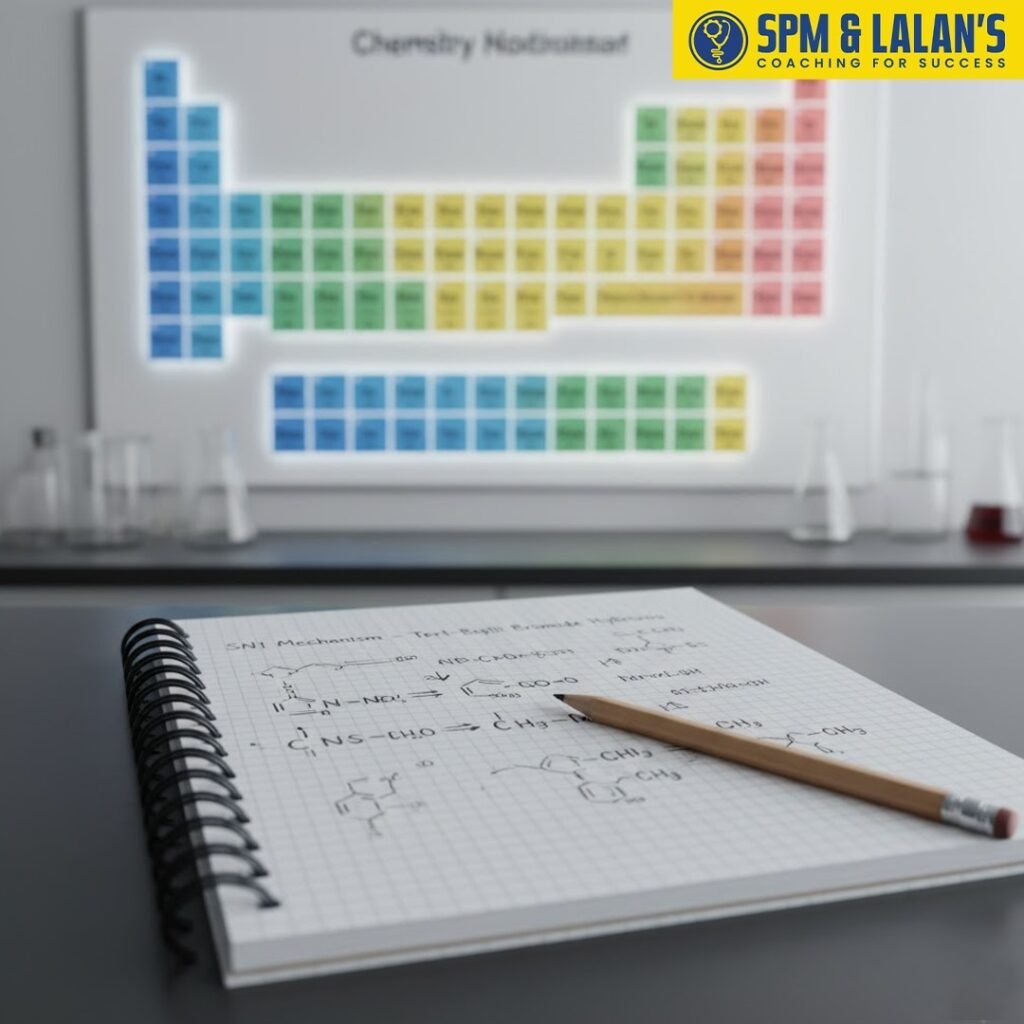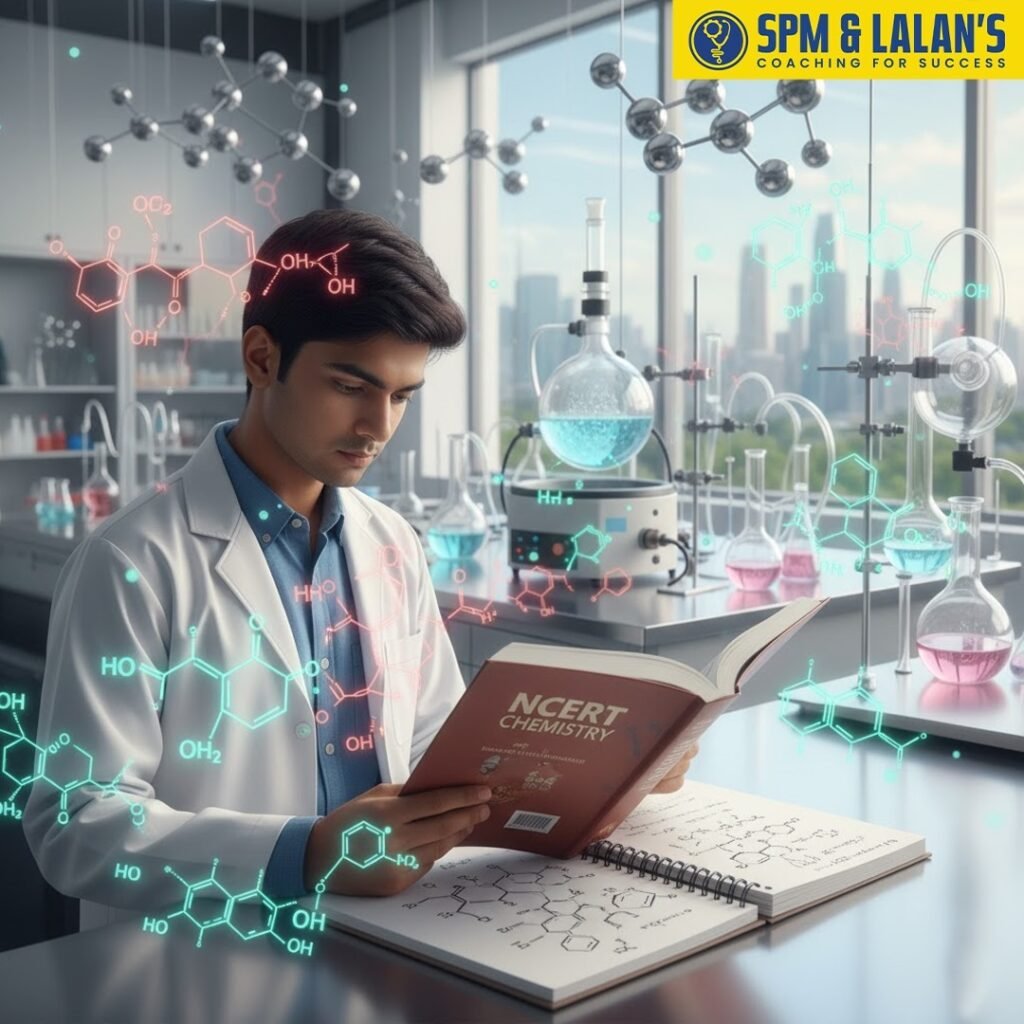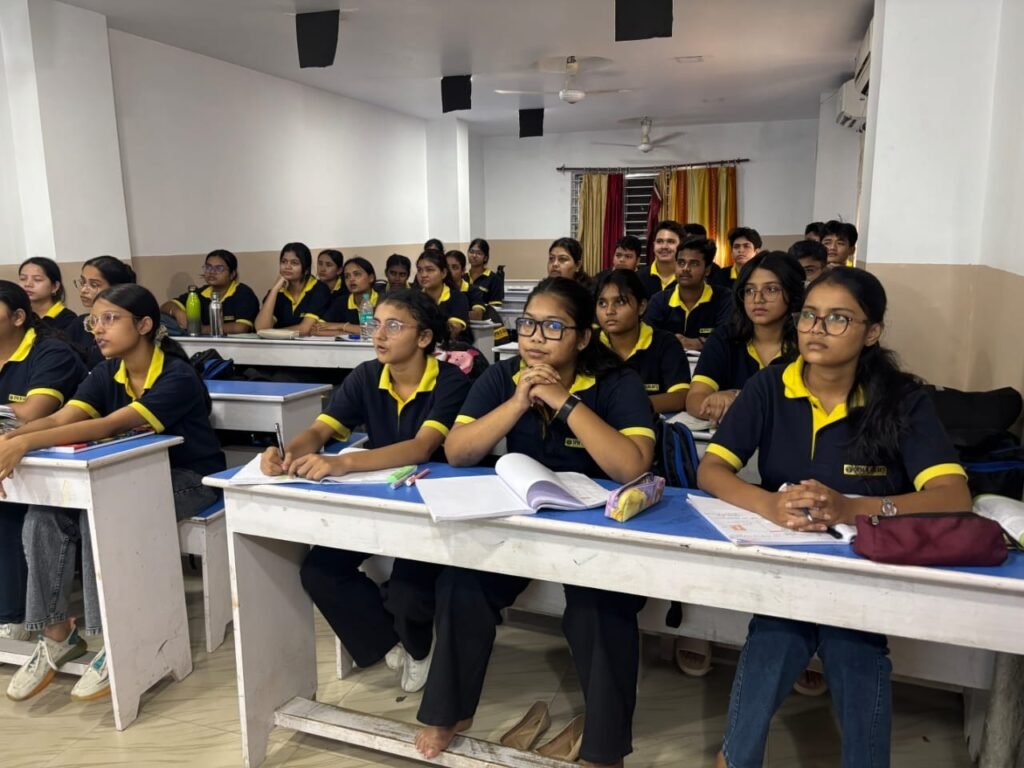When it comes to cracking JEE Main Chemistry PYQ, strategic preparation matters more than just hard work. At SPM & Lalan’s coaching , we’ve spent years decoding trends from the 2019 to 2024 question papers, helping thousands of aspirants understand what truly works in Chemistry. Hence , this analysis will guide you through topic weightage, difficulty levels, and evolving question patterns, ensuring you prepare with clarity and confidence.
Overview of JEE Main Chemistry PYQ (2019–2024)

Chemistry in JEE Main is not only scoring but also concept-driven. Each year, NTA maintains a balance between Physical, Organic, and Inorganic Chemistry, but subtle shifts in question type and emphasis can change the game. Hence , by analyzing JEE Main Chemistry PYQ, students can recognize repetitive concepts, high-weightage chapters, and time-saving strategies that matter most during the exam.
Year-Wise Difficulty Trend (2019–2024)
| Year | Overall Difficulty | Focus Area | Key Observation |
| 2019 | Moderate | Physical Chemistry | More numerical problems |
| 2020 | Easy to Moderate | Inorganic Chemistry | Direct NCERT-based questions |
| 2021 | Moderate | Organic Chemistry | Mechanism-based conceptual questions |
| 2022 | Moderate to Tough | Physical Chemistry | Strong emphasis on calculations |
| 2023 | Easy | Inorganic Chemistry | Mostly theory-based questions |
| 2024 | Moderate | Organic Chemistry | Mixed conceptual and application-based questions |
Hence , one thing is clear from this trend that JEE Main Chemistry PYQ always tests conceptual understanding along with problem-solving ability. Therefore, focusing on fundamentals, especially from NCERT, remains the key. You can also explore a detailed JEE Main Past 5 Years Trend Analysis to understand how subject-wise trends have evolved across sessions and how Chemistry fits into the broader JEE Main pattern.
Topic-Wise Weightage Analysis (Average of 2019–2024)
| Section | Average Weightage | Commonly Asked Chapters |
| Physical Chemistry | 10–12 Questions | Mole Concept, Thermodynamics, Electrochemistry |
| Inorganic Chemistry | 8–10 Questions | Coordination Compounds, Periodic Table, Chemical Bonding |
| Organic Chemistry | 10–12 Questions | GOC, Hydrocarbons, Biomolecules, Polymers |
Hence , we can say that JEE Main Chemistry PYQ indicates that Physical Chemistry questions are more calculation-based, whereas Inorganic focuses on direct theory, and Organic tests application and mechanisms.
Trend Insights: What Changed Over the Years
- Shift Toward Conceptual Understanding – Post-2021, more application-based questions appeared, especially in Organic Chemistry.
- Rise in NCERT-Oriented Questions – The JEE Main Chemistry PYQ shows that NCERT-based theory dominates 60–70% of questions.
- Less Time, More Accuracy – Moreover, chemistry remains the most scoring section because most questions require direct conceptual recall rather than long calculations.
- Repeated Topics – Additionally, questions from Coordination Compounds, Chemical Bonding, and Electrochemistry frequently repeat in various forms.
How to Use JEE Main Chemistry PYQ Effectively
To maximize the benefits from JEE Main Chemistry PYQ, aspirants should follow a structured approach:

- First , Start with NCERT: Every single PYQ can be traced back to NCERT fundamentals.
- Second , Analyze Year-Wise Trends: Identify which topics frequently appear across years.
- Third , Practice Timed Mock Sessions: Solve previous papers under real exam conditions.
- Moreover , Revise Repeated Concepts: Focus more on recurring areas like Mole Concept, GOC, and Coordination Compounds.
- Lastly , Review Mistakes: Keep a log of incorrect answers to ensure conceptual clarity.
Expert Insights from SPM & Lalan’s Faculty

Our faculty at SPM & Lalan’s, including renowned Chemistry mentor Lalan Kumar, strongly emphasizes pattern recognition. Over the years, we’ve noticed that JEE Main Chemistry PYQ tends to reward consistency and conceptual depth rather than rote memorization.
- Students who revise NCERT twice before mocks consistently score above 85 percentile in Chemistry.
- Moreover , practicing topic-wise PYQs improves accuracy by nearly 30%.
- Additionally, revisiting solved PYQs every two weeks helps retain reaction mechanisms and formulas effectively.
Preparation Tips Based on JEE Main Chemistry PYQ (2019–2024)
- First , focus on NCERT Examples and Exercises.
- Second , maintain a formula sheet , especially for Physical Chemistry.
- Master Concept Maps , which is important for quick Organic reaction recall.
- Moreover , attempt PYQs after every chapter , instead of leaving them for the end.
- Lastly , revise daily in short bursts , because frequent short revisions beat long cramming sessions.
Why JEE Main Chemistry PYQ Is a Game-Changer
When used properly, JEE Main Chemistry PYQ acts like a blueprint for your success. It helps you identify the exact question types, ideal time management strategies, and the importance of conceptual clarity over guesswork. Every top scorer we’ve mentored at SPM & Lalan’s coaching has relied heavily on these PYQs for last-stage revision.
Final Thoughts
If you’re serious about scoring high in Chemistry, start with JEE Main Chemistry PYQ before moving to complex problem books. By understanding past trends, you build a roadmap for what’s coming next. At SPM & Lalan’s coaching , our structured PYQ-based practice sessions have helped students turn average attempts into top scores , all through precision, clarity, and consistency.
Remember, the secret isn’t in studying everything . It’s in studying what matters most. Moreover , the JEE Main Chemistry PYQ from 2019–2024 already shows you exactly what that is.
FAQs
1. How should I start solving PYQs?
Start by selecting one chapter at a time from your NCERT syllabus and then solve its PYQs. Avoid jumping directly into full papers. Topic-wise practice builds confidence and helps you identify repeated question patterns.
2. Are PYQs enough to score above 90 percentile?
They are very helpful but not enough alone. Use them along with NCERT, mock tests, and regular revision. PYQs help you understand trends, but consistent practice improves speed and accuracy.
3. How often do questions repeat in JEE Main Chemistry?
Direct repetition is rare, but concepts and patterns reappear frequently. For example, topics like Coordination Compounds and GOC are almost always asked in some form.
4. Which section is most scoring in Chemistry — Physical, Organic, or Inorganic?
Inorganic Chemistry is generally the most scoring since many questions come directly from NCERT. Physical Chemistry can also fetch easy marks if your formulas, concepts, and calculations are strong.
5. How does SPM & Lalan’s coaching help students with PYQs?
At SPM & Lalan’s Coaching, we conduct regular PYQ-based tests, provide in-depth explanations, and teach shortcut techniques for faster solving. Our analysis-driven approach helps students understand what, why, and how, improving prediction and performance.



